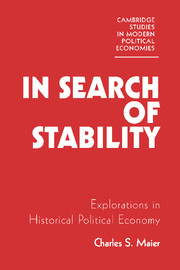Book contents
- Frontmatter
- Contents
- Acknowledgments
- Introduction: Political economy and history
- Part I Ideology and economics from World War I to midcentury
- 1 Society as factory
- 2 The economics of Fascism and Nazism
- 3 The politics of productivity: foundations of American international economic policy after World War II
- 4 The two postwar eras and the conditions for stability in twentieth-century Western Europe
- Part II Collective preferences and public outcomes
- Conclusion: why stability?
- Index
1 - Society as factory
Published online by Cambridge University Press: 15 December 2009
- Frontmatter
- Contents
- Acknowledgments
- Introduction: Political economy and history
- Part I Ideology and economics from World War I to midcentury
- 1 Society as factory
- 2 The economics of Fascism and Nazism
- 3 The politics of productivity: foundations of American international economic policy after World War II
- 4 The two postwar eras and the conditions for stability in twentieth-century Western Europe
- Part II Collective preferences and public outcomes
- Conclusion: why stability?
- Index
Summary
This chapter incorporates an article from 1970 and the major part of a 1984 essay on related themes. “Between Taylorism and Technocracy: European Ideologies and the Vision of Industrial Productivity in the 1920s” was written for a prize competition in memory of Klaus Epstein sponsored by the Journal of Contemporary History, where it appeared in vol. 5, no. 2 (April 1970), 27–61. Since its original publication, scientific management and industrial rationalization have continued to attract scholarly interest in Europe and the United States. The essay was also published in French in Recherches, no. 32–3 (September 1978: Le soldat du travail), 95–136, D. Dumoy, trans.; reportedly in an obscure Italian review, Quaderni del Progetto, which never contacted the author; and in an abridged German version as “Zwischen Taylorismus und Technokratie: Gesellschaftspolitik im Zeichen industrieller Rationalität in den zwanziger Jahren in Europa,” in Michael Stürmer, ed., Belagerte Civitas, Die Weimarer Republik (Cologne: Neue Wissenschaftliche Bibliothek, 1980), 188–213.
Whereas the 1970 essay stressed the political implications of Taylorism and Fordist concepts, scholarship in the intervening years has focused on the actual implantation and practice of scientific management. Recent research would lead me to amend some of my detailed points, and especially to credit a wider French enthusiasm for scientific management than my article suggested. Taylorism, the original essay proposed, derived much of its appeal from its implicit political promise to overcome class conflict. But as recent writers have emphasized, in the wake of repeated revolutions, nineteenth-century French liberals sought to preclude political upheaval by strengthening social networks: emphasizing “solidarity,” sanctioning professional associations and even unions, encouraging benevolent societies, cooperatives, and insurance pools.
- Type
- Chapter
- Information
- In Search of StabilityExplorations in Historical Political Economy, pp. 19 - 69Publisher: Cambridge University PressPrint publication year: 1988
- 1
- Cited by

